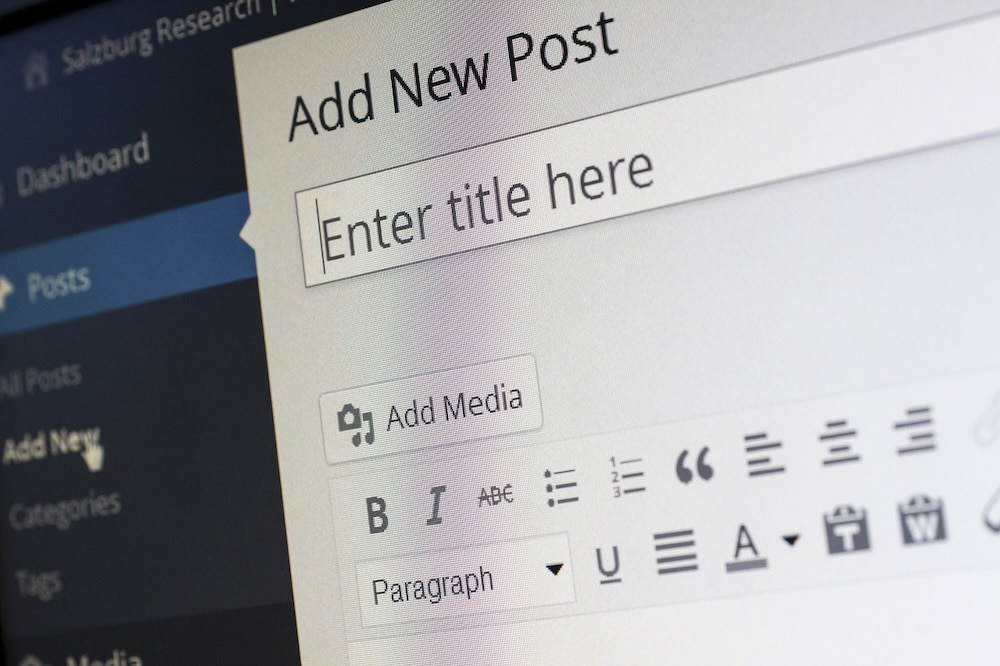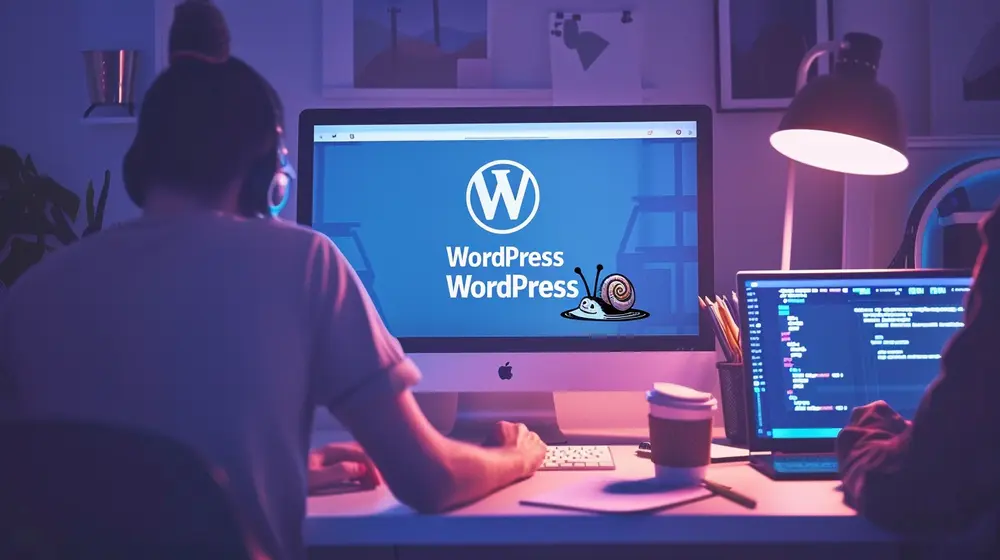Why is my WordPress site so slow?
A WordPress website can be slow for several reasons. The most common issue is a slow WordPress theme, large images (and other assets), lots of unnecessary scripts, and poor hosting.
In this article, we will talk about these issues in more detail and provide ideas on how to fix them.
Table of Contents
WordPress Background
WordPress began as a tool for blogging in the early 2000s and has since expanded to support more than 43% of websites online. It’s a versatile content management system (CMS) that enables features such as blogging and online stores.
To start a WordPress project, you have two options. You can download and set up the free, open-source version from wordpress.org, or you can sign up at wordpress.com for a hosted solution, which has a monthly cost.
WordPress is both powerful and adaptable, suitable for everything from web development to simple blogging. However, building a website can become complex. If you find it challenging, consider hiring a WordPress developer for assistance.

Why WordPress
WordPress is a powerful and adaptable platform, offering several benefits compared to HTML and static websites.
Here are some key advantages:
- Clients can easily update and manage their content without needing technical help.
- The blogging feature is seamlessly integrated, making it simple to manage alongside your website.
- There are thousands of plugins available, allowing you to add new features without needing to pay for custom development.
- You don’t need to know how to code or program to set up or update a WordPress site.
- WordPress is excellent for search engine optimization (SEO). It makes creating content straightforward and can help automate many SEO tasks.
This makes WordPress a smart choice for anyone looking to build or maintain a website efficiently.
Why is my WordPress site so slow to load?
A WordPress website can sometimes load slowly, and there are a few usual suspects behind this. Often, the culprits include a sluggish WordPress theme, oversized images and files, too many unneeded scripts, and subpar hosting services.
In the next few sections, we will guide you and help you apply 5 easy fixes to fix your website performance and resolve the dreaded “Why is my WordPress site so slow” question.
5 easy fixes to fix WordPress slowness issues
We help clients troubleshoot WordPress performance issues all the time. The most common issues we see are:
- Slow and unreliable hosting
- Using a theme that is bloated or not developed using best practices
- Large images (or videos) that are not compressed
- Lots of plugins that run unnecessary scripts or conflict with each other
- No caching or misconfigured caching plugins
Let’s break these down and give you some tips on how to resolve them.
Pick a fast and efficient hosting provider
Poor hosting can severely impact your WordPress site speed. Not only that, but poor hosting can also make your website unreliable, exposed to security risks, and lead to frequent outages which can frustrate your visitors.
When your website is hosted on an overcrowded server, lacks sufficient processing power, or suffers from poor network connectivity, it struggles to handle incoming traffic efficiently. Essentially, these limitations prevent the server from quickly processing and responding to user requests.
As a result, visitors experience longer loading times for your website’s pages. In a nutshell, the capacity and quality of your hosting server directly influence the speed at which your website operates, affecting user experience.
Budget hosting providers will often install several websites on one server so your website might be competing for resources with other customers. To avoid this, use one of our recommended hosting providers (please note these are affiliate links):
We use all of the above providers and can personally vouch for all of them when it comes to great support, performance, and reliability. If you want to learn more check out this article where we compare these hosting providers.

Pick a fast and lightweight WordPress theme
Picking a fast and lightweight WordPress theme is one of the most important strategies. A slow and bloated theme can severely impact your website’s performance.
Some themes are developed inefficiently and aren’t built for speed. Others prioritize speed and efficiency which sets your business up with a good foundation.
Slow themes often load unnecessary code, use a lot of inefficient plugins, and sometimes don’t incorporate development best practices.
We have supported and provided troubleshooting services for many clients so we have encountered a lot of great and not-so-great WordPress themes.
Here are a few themes that we are happy to recommend that won’t slow your website down and will ensure that your website loads quickly:
- Hello by Elementor (if you use Elementor Pro this theme is awesome)
- GeneratePress
- Astra
- Neve
- Blocksy
- Kadence

Compress and resize your images
Large images and videos can severely impact your website performance. It’s one of the most common issues that we see when troubleshooting slow websites.
To optimize your images follow these steps:
- Resize images so that they are just the right size. For example, if a section is only 500 pixels wide, use an image that is 500px and not 5000px. You can easily resize an image on a Mac or Windows without any additional software.
- Compress your images so that they don’t lose quality but reduce the file size. There are lots of great services that do this for free such as tinypng and iloveimg.com.
- Use newer and more modern file extensions like webp and avif. You can convert jpeg and png images to these formats for free using services like Convertio.
Videos make a website look cool and unique but can significantly slow down a website. If you must use videos, upload them to a third-party service like YouTube or Vimeo and embed them into your website. Or if you want to host them locally, make sure you convert them to a webm format using Convertio so that they are compressed and don’t take up a lot of bandwidth.
Another trick to speed up your website is to load images and videos in “lazy load” mode. This means that images and videos will only load after a user scrolls to that section of the website. This only works for images and videos below the fold (or below the initial screen that the user sees when they land on your website). This is a feature that most optimization plugins in WordPress offer (such as WP Rocket and Perfmatters which are covered in a section below).
The cool thing about WordPress is that there are free image optimization plugins that can automate image compression for you. Our recommendations are the SiteGround Optimizer (free), Imagify (free limited version), or ShortPixel (free limited version).

Avoid using unnecessary plugins
Not all plugins are bad, but some are worse than others. Having too many plugins doesn’t mean that a website will load slowly, but more often than not, having too many plugins will bog a website down.
This is because each plugin has its own library of files, fonts, scripts, and sometimes images that are loaded when a user lands on your page. This is especially true for plugins and tools that help you visually design a website.
A good rule of thumb that we came up with is not to use more than 10 plugins. Using only absolutely necessary plugins is usually the best way to proceed and to ensure that your website remains fast.
Install and configure a caching and performance plugin
Caching and performance plugins can help speed up a slow and inefficient website but they can also mask certain issues so you have to proceed carefully.
We use WP Rocket and Perfmatters to implement browser caching and other performance improvements. These plugins can help your website load fast by implementing the following improvements:
- They can help users access a cached and static version of the website without querying the database every time they load your website.
- Performance plugins can defer scripts and code that isn’t needed when a page is initially opened.
- They can defer loading images that aren’t visible when a user first opens a page (called lazy loading).
- These plugins can also remove unnecessary code from your website when it’s loaded which significantly improves load times.
These are just some of the improvements that you can make using caching and performance plugins and we highly recommend the following:
- WP Rocket (paid-only plugin)
- Perfmatters (paid-only plugin)
- W3 Cache (free alternative to WP Rocket)
- Autoptimize (free alternative to WP Rocket and Perfmatters)
- WP Asset CleanUp (free alternative to Perfmatters and WP Rocket)
Combining more than one performance plugin is dangerous and can break your website. If you are not a professional, we recommend using WP Rocket (because it’s easy to configure and use) or hiring a professional to help you configure and tune your website. If you want to learn how to use WP Rocket, check out our detailed write-up.
How Clio Websites can help
Following the advice in this post can help you improve WordPress speed and performance. Our recommendations and techniques are based on years of experience helping businesses just like yours.
We hope that you never have to ask yourself the question “Why is my WordPress site so slow?” but if you do, reach out to us. We have helped many clients improve their speed scores. We have been developing websites and providing website maintenance services since 2006.
Contact us if you would like us to help you speed up your WordPress website.



